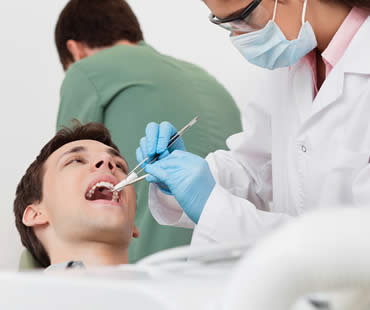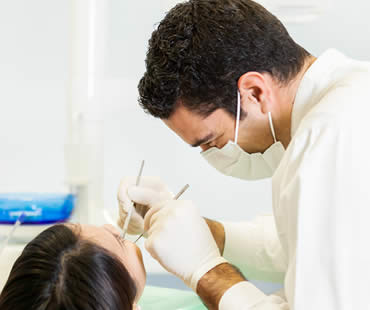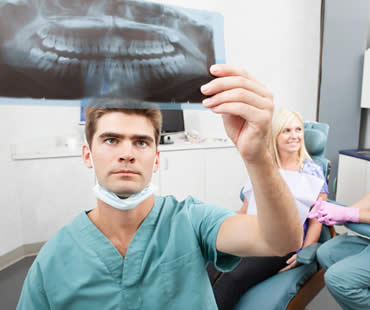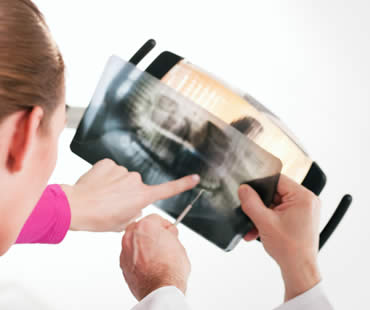
There are a number of reasons that dentists or oral surgeons recommend surgery, but facial injuries are probably the most unexpected and alarming cause. Maxillofacial injury, or facial trauma, refers to any injury to the mouth, jaw, and face. Most of these injuries result from sports, car accidents, job accidents, violence, or an accident at home. Let’s learn about oral surgery resulting from facial trauma.
Broken bones are a common type of serious facial injury. Fractures can occur in the upper or lower jaw, cheekbones, palate, and eye sockets. Injuries in these locations may affect vision and the ability to eat, talk, and breathe. Hospitalization is often required for treatment, which is similar to that for fractures in other parts of the body. The bones must be lined up and held in place to allow time to heal them in the correct position. Because casts are not possible in facial injuries, the surgeon may use wires, screws, or plates to treat fractures. Sometimes healing takes as long as six weeks or more.
Even though some facial injuries are worse than others, all of them should be taken seriously. They affect an important area of the body, so it is recommended to seek treatment from an oral surgeon to make sure you receive optimum care. Even if stitches are all that’s required, it’s best to have them performed by an oral surgeon who can place them exactly as needed to produce the best results.
It’s no surprise that the best solution for facial injuries is to prevent them in the first place. Oral surgeons suggest consistent use of mouth guards, seat belts, and masks and helmets as required. Improvements have been made to safety gear to make these items more comfortable and efficient, so there should be no excuses for not using them to protect yourself and avoid injuries that can lead to oral surgery.
Our dental office is located in Lawrence MA

Obstructive sleep apnea is a condition created when a portion of the upper airway is blocked, causing breathing interruptions during sleep and low blood oxygen levels. As many as 20% of adults are affected by mild obstructive sleep apnea, while one in fifteen suffers from more severe apnea.
Symptoms of obstructive sleep apnea include snoring, extreme daytime drowsiness, restless sleep, high blood pressure, depression, problems with mental function, as well as a host of other mental and physical concerns. Left untreated, obstructive sleep apnea can lead to a long list of serious medical conditions, including hypertension, heart attack and stroke.
If you have been diagnosed with obstructive sleep apnea, your doctor may initially treat the condition with a CPAP device that you wear while sleeping. While a CPAP machine will reduce the obstruction to the airway, it is not a cure and will only be effective during use. Other non-surgical treatment recommendations may include the wearing of mouthguards to reposition the jaw, sleep position changes, or weight loss.
Tongue muscle advancement involves moving the bony attachment of the tongue muscles, and can be combined with palatal surgery to reduce excess tissues. This therapy may also include removing enlarged tonsils and nasal surgery. These treatments are most often used for milder cases of obstructive sleep apnea.
However, if these treatments do not work or for more severe cases of obstructive sleep apnea, oral surgery offers solutions to correct apnea. Maxillomandibular Advancement is a procedure that repositions the upper and lower jaw and chin to open the airway. This treatment is highly successful and offers the greatest chance of permanent correction in moderate to severe cases of obstructive sleep apnea.
For more information about how surgical therapies and treatments can be utilized to address your obstructive sleep apnea, consult with a qualified oral and maxillofacial surgeon.
Our dental office is located in Lawrence MA

Wisdom teeth are the last adult teeth to erupt into the mouth, generally emerging between the ages of seventeen and twenty-one. They are the third set of molars and are in pairs: two each on the top and bottom arch of teeth. While some patients don’t have wisdom teeth, most do. Many of those who do have them don’t have enough room for those teeth to erupt fully, causing them to be wedged under the back of another tooth, impacted in the gum.
Impacted wisdom teeth are very difficult to clean, and can negatively affect the surrounding teeth. They are highly vulnerable to disease and decay and may lead to tooth pain and damage to adjacent teeth. For these and other reasons, a dentist may recommend that the teeth be extracted through oral surgery as soon as necessary to prevent any problems.
Extraction of wisdom teeth is typically an outpatient procedure done in an oral surgeon’s office. A healthy patient can proceed with a typical surgery, but if any infection is detected, the surgery can’t move forward until the infection is cleared up through the use of a full course of antibiotics. Once the surgery is moving forward, the surgeon’s team will administer some form of anesthesia to numb the area surrounding the tooth or to possibly sedate the patient through IV sedation dentistry.
After the anesthesia has fully taken effect, the surgeon makes an incision to open the gum and to remove any bone that is blocking the tooth from extraction. The tissue connecting the bone to the tooth will be separated and the tooth will be removed. In some cases, the surgeon will have to break the tooth into smaller pieces to make it easier to remove. After thoroughly cleaning the area and removing any remaining debris, the incision will be closed, stitched and packed with sterile cotton gauze to staunch any bleeding.
The surgeon will provide aftercare instructions. Patients should follow these instructions to the letter in order to ensure the best and fastest healing of the surgical site.
If you need a dentist in Lawrence MA contact us today

Gum disease is a serious problem. You should treat it as soon as possible following the recommendations of your dentist. Also known as periodontal disease, it has several treatments, depending on the severity of the issue.
Your first course of action is to completely revamp your oral hygiene habits. Daily flossing and brushing following meals are essential habits to develop. You must have a clean mouth before you go to bed. If you smoke, you should stop. Your mouth’s health depends on it.
If you haven’t been keeping up with your professional checkups and cleanings, you need to start again. Long-term gum health is greatly impacted by the plaque, tartar, food debris and bacteria left on teeth. Hardened calculus, or calcified plaque, can be removed using a process called scaling. This process may require local anesthesia.
Your progress will be evaluated by your dentist to see if your gum tissue is recovering. With enough progress and response to treatment, your gum disease treatment may not progress beyond these initial steps; however, for more severe cases of gum disease, you may require oral surgery.
Surgical procedures are available that can regenerate and repair the soft gum tissue in the mouth, as well as hard tissues such as bone or teeth. Your oral surgeon will want to reduce or completely eliminate gum pockets, or open areas beneath the gum line, improving and renewing gum to tooth attachment. Normal oral functions and aesthetic appearances are aimed to be restored.
There are many sedation dentistry options available to patients treating their gum disease with oral surgery. These include local anesthesia and IV or conscious oral sedation. Talk to your oral surgeon to see what’s appropriate for your specific needs.
Don’t wait to treat your gum disease. Do what you need to do to ensure a lifetime of better oral hygiene and gum health.
If you need a dentist in Lawrence MA contact us today

Wisdom teeth are really just your third molars, located in the very back of your tooth arch and are the last of your adult teeth to erupt. They most commonly erupt between the ages of 17 and 20. Most people have them, but for some people, these third molars simply do not develop. Some patients might have more than one set of wisdom teeth! Only an x-ray can reveal the complete story.
A high number of patients who possess wisdom teeth don’t know they have them because the teeth are impacted, or stuck underneath already erupted teeth, as opposed to erupting normally through the gums. This is when wisdom teeth become problematic.
The patient’s jaw may be too small to allow for the full eruption of the wisdom tooth, leading to it becoming stuck in the jaw, pushing at other teeth, causing pain and shifting of the teeth. The tooth might be able to erupt partially, triggering a flap of gum tissue to develop over the tooth, trapping bacteria and germs which can lead to serious infection.
Sometimes wisdom teeth come in at strange angles, facing sideways or backward, or they develop a serious infection and damage the surrounding teeth. They can also lead to the development of a cyst or cause damage to the jawbone.
If your dentist has told you that you need to have your wisdom teeth out, it’s a good idea to listen and to follow that advice. Removing problematic wisdom teeth can reduce crowding in the mouth, infection in the gums or tooth decay in the wisdom tooth or in the surrounding teeth.
The younger you are when you have your wisdom teeth removed, the easier it is to recover. Ask your dentist to learn more about wisdom teeth and about your particular needs as a patient.
We look forward to seeing you in our Lawrence MA dental office

If your teen is scheduled to have wisdom teeth extraction surgery, you might be feeling stressed-out about the procedure and how you can best prepare for what’s to come. Surgery can be frightening. As the adult, it’s your role to get the information you need and to educate and calm your teen so that you both have a feeling of confidence and safety during all steps of the oral surgery.
Don’t mislead your teen about the procedure or recovery time. Talk about the reasons the wisdom teeth need to be extracted; be honest about the issues. Talk about the oral surgeon and his or her qualifications and why this particular surgeon was chosen. Help give your teen a sense of trust in the surgeon, to help calm his or her nerves.
Listen to everything your child has to say regarding the surgery. Validate all your child’s feelings and statements and offer any guidance you can from your own life’s experiences. Be open to allowing a conversation between the surgeon and your teen. Your oral surgeon has experience in dealing with fearful patients and can often remedy fearful thoughts and feelings more efficiently than a parent.
Reassure your child that you won’t be far away during or after the procedure. Even though your teen may be already in college, surgical procedures can be frightening and you might be surprised at how much your teen may lean on you, emotionally and physically during this time.
Answer any of your child’s questions honestly. Go over any parts of the surgery that are confusing to your teen. This knowledge can restore a sense of control to the patient, and allow the patient to feel prepared to recover.
Your teen’s oral maxillofacial surgeon wants your teen to be comfortable during the surgery. Sedation dentistry options may be offered as early as the night before, so that the patient can be well-rested and calm for the procedure.
If you need a dentist in Lawrence MA contact us today










